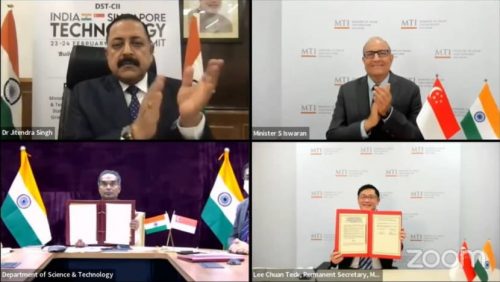
Singapore and India will cooperate in the areas of science, technology and innovation, following the recent signing of a memorandum of understanding (MoU) between the two countries during the India-Singapore Technology Summit 2022.
The virtual summit which was co-organised by Singapore’s Ministry of Trade and Industry (MTI), India’s Department of Science and Technology (DST) and the Confederation of Indian Industry (CII).
In a media release, MTI said the agreement would “encourage, develop and facilitate collaborative projects in fields of mutual interest”.
These projects could advance progress in research, innovation and technological development in sectors such as advanced engineering and manufacturing, health and other emerging technologies, the ministry added.
Speaking during the summit, Singapore’s Minister-in-charge of Trade Relations S Iswaran said such international collaborations in technology and research are “vital to building commercially viable solutions that can save lives and livelihoods”.
Potential areas of collaboration
Iswaran, who is also Transport Minister, identified three areas where the two countries could “push the boundaries” by combining their research and development talent and resources.
“First, deeptech. Artificial Intelligence and the Internet of Things, or IoT, hold much potential in a wide range of areas. This includes the construction and built environment sector, which we seek to transform to become more integrated and resilient,” he said.
This would lay the foundation for the building of “smarter and more sustainable cities”, he added, noting that Iswaran pointed to cleantech as another potential area of collaboration.
“R&D advancements in this domain could have a profound impact on greening the power and transportation sectors, particularly aviation and maritime transport,” he said.
The third area where the two countries can partner is in the field of genome and bioinformatics research, said Iswaran.
“Some of our researchers, including from A*STAR’s Genome Institute of Singapore, have embarked on the ambitious task of mapping Asian genomes, which I understand is an understudied and underpopulated dataset. This could be coupled with ongoing efforts in India to develop a similar dataset,” he said.
Iswaran added that “cross border flows of data” are crucial to the success of such initiatives, giving the example of data from IoT sensors in buildings and cities to inform better urban planning.
“We therefore look forward to the finalisation and passing of the Personal Data Protection Bill in India, which will facilitate such cross-border data flows,” he said.
The summit also saw the signing of an implementation agreement between Enterprise Singapore (ESG) and India’s DST, to bring together corporates and start-ups from both countries to collaborate on developing new innovative technologies and solutions.
“DST and ESG will open at least one call for proposal annually to invite joint proposals by Singapore and Indian companies and funding will be provided for the final approved innovation projects,” said MTI.
“Through this collaboration between the Department of Science and Technology and Enterprise Singapore, joint research and innovation projects between more Singapore and Indian corporates and start-ups will be co-funded to enable them to capture new business opportunities,” said ESG assistant chief executive for innovation and enterprise Edwin Chow.
“This is especially so in areas like the green economy, advanced manufacturing and agritech which are of mutual interest to both countries’ economic transformation and growth,” he added.
























